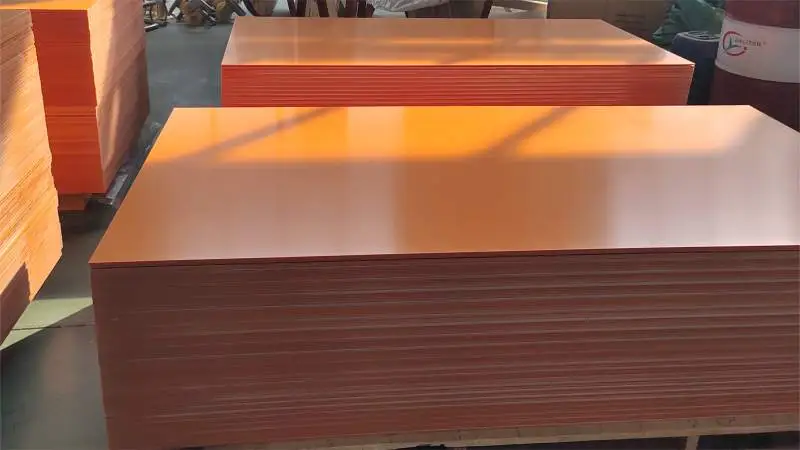Properties of Bakelite Sheets Crucial for Electrical Insulation
Dielectric Strength and Voltage Resistance
Bakelite sheets boast impressive dielectric strength, a critical property for electrical insulation materials. This characteristic enables Bakelite to withstand high voltage gradients without breakdown, making it an ideal choice for numerous electrical applications. The voltage resistance of Bakelite sheets is influenced by factors such as thickness, surface condition, and environmental conditions. Typically, Bakelite boards can withstand voltages ranging from 15 to 40 kV/mm, depending on the specific grade and manufacturing process.
Thermal Conductivity and Heat Resistance
The thermal properties of Bakelite sheets contribute significantly to their performance in electrical insulation. These materials exhibit low thermal conductivity, which helps prevent heat transfer and protects sensitive components. Bakelite's heat resistance is another crucial factor, allowing it to maintain its insulating properties even at elevated temperatures. The heat deflection temperature of Bakelite sheets can range from 120°C to 150°C, ensuring stability in various operating conditions.
Mechanical Stability and Dimensional Accuracy
Bakelite sheets offer excellent mechanical stability, which is essential for maintaining consistent insulation performance over time. The material's high compressive strength and dimensional stability ensure that it retains its shape and properties under mechanical stress. This stability is particularly important in applications where precise tolerances are required. Bakelite boards typically have a flexural strength ranging from 80 to 110 MPa, providing robust support in electrical assemblies.
Environmental Factors Affecting Bakelite Sheet Performance
Moisture Absorption and Humidity Resistance
The performance of Bakelite sheets in electrical insulation can be influenced by their interaction with moisture. While Bakelite generally exhibits low moisture absorption rates, prolonged exposure to high humidity environments can affect its insulating properties. The water absorption rate of Bakelite sheets typically ranges from 0.05% to 0.3% over 24 hours, depending on the specific grade. Understanding these characteristics is crucial for selecting the appropriate Bakelite board for different environmental conditions.
Chemical Resistance and Corrosion Protection
Bakelite sheets demonstrate excellent resistance to a wide range of chemicals, enhancing their durability in various applications. This property is particularly valuable in electrical insulation scenarios where exposure to corrosive substances is possible. The chemical resistance of Bakelite helps protect underlying components from degradation, ensuring long-term reliability. However, it's important to note that certain aggressive chemicals may still affect Bakelite's performance, necessitating careful consideration of the operating environment.
UV and Weathering Resistance
For outdoor electrical applications, the UV and weathering resistance of Bakelite sheets becomes a critical factor. While Bakelite generally offers good resistance to environmental degradation, prolonged exposure to sunlight and extreme weather conditions can impact its surface properties and overall performance. Some Bakelite grades are specifically formulated with UV stabilizers to enhance their outdoor durability, making them suitable for applications exposed to harsh environmental conditions.
Application-Specific Considerations for Bakelite Sheets
Frequency Response and Dielectric Loss
When using Bakelite sheets in high-frequency applications, their frequency response and dielectric loss characteristics become crucial. Bakelite exhibits relatively low dielectric losses, making it suitable for a wide range of frequencies. However, at very high frequencies, the material's performance may change, potentially affecting its insulating properties. The dissipation factor of Bakelite sheets typically ranges from 0.03 to 0.05 at 1 MHz, providing a balance between insulation and energy efficiency in many electrical systems.
Machinability and Fabrication Techniques
The ease of machining and fabrication is an important consideration when working with Bakelite sheets for electrical insulation. Bakelite can be readily machined using conventional tools, allowing for precise cutting, drilling, and shaping to meet specific application requirements. However, care must be taken to avoid overheating during machining, which can affect the material's properties. Advanced fabrication techniques such as laser cutting and water jet cutting can also be employed for intricate designs, offering enhanced precision and efficiency in Bakelite board processing.
Long-term Aging and Performance Stability
The long-term performance of Bakelite sheets in electrical insulation applications is a critical factor to consider. While Bakelite is known for its durability, prolonged exposure to electrical stress, heat, and environmental factors can lead to gradual changes in its properties. Understanding the aging characteristics of Bakelite is essential for predicting its lifespan and ensuring reliable performance throughout the intended service life of the electrical system. Regular monitoring and testing of Bakelite insulation components can help identify any degradation and maintain optimal system performance.
Conclusion
Bakelite sheets offer a compelling solution for electrical insulation, combining excellent dielectric properties with robust mechanical and thermal characteristics. By carefully considering factors such as dielectric strength, thermal conductivity, environmental resistance, and application-specific requirements, engineers and designers can optimize the use of Bakelite boards in various electrical systems. The material's versatility, coupled with its proven track record in electrical applications, positions Bakelite as a reliable choice for insulation needs across diverse industries. As technology advances, ongoing research continues to enhance the properties of Bakelite sheets, further expanding their potential in electrical insulation applications.
Contact Us
For more information about our high-quality Bakelite sheets and expert guidance on selecting the right insulation materials for your specific needs, please don't hesitate to contact us at info@jhd-material.com. Our team of experienced professionals is ready to assist you in finding the perfect solution for your electrical insulation requirements.






